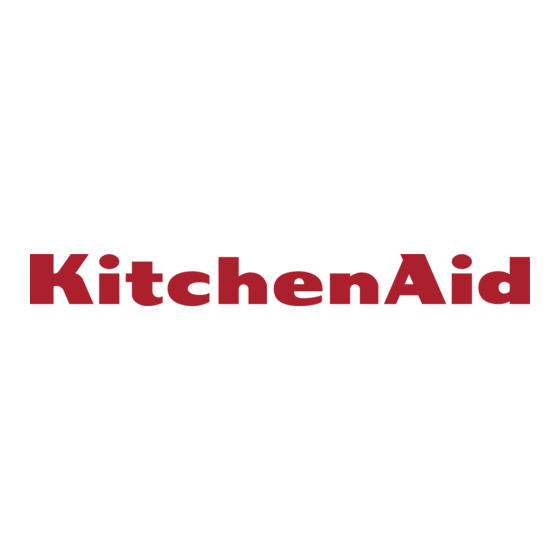KitchenAid KECD805H Manual de utilização e cuidados - Página 7
Procurar online ou descarregar pdf Manual de utilização e cuidados para Placa de fogão KitchenAid KECD805H. KitchenAid KECD805H 20 páginas. Electric downdraft ceramic glass cooktop
Também para KitchenAid KECD805H: Manual de utilização e cuidados (16 páginas), Manual de utilização e cuidados (16 páginas)

IMPORTANT:
Donotleave e mpty cookware ona hotsurface
cooking a rea, e lement orsurface b urner.
Ideal cookware should have aflatbottom, straight sides and a
well-fitting lid,andthematerial should b eofmedium-to-heavy
thickness.
Rough f inishes may scratch t hecooktop. Aluminum andcopper
may beused asacore orbase incookware. However, when used
asabase they canleave p ermanent marks o nthecooktop o r
grates.
Cookware material isafactor i nhow quickly a ndevenly h eat i s
transferred, which affects c ooking r esults. Anonstick finish has
thesame characteristics
asitsbase material. For e xample,
aluminum c ookware witha nonstick finish will t ake onthe
properties ofaluminum.
Onsome models, griddles w ithnonstick s urfaces should notbe
used inthebroiler.
Use thefollowing c hart a saguide forcookware material
characteristics.
COOKWARE CHARACTERISTICS
Aluminum
• Heats q uickly a nd evenly.
• Suitable foralltypes ofcooking.
• Medium orheavy t hickness isbest
formost c ooking t asks.
Cast
iron
•
Heats slowly and evenly.
•
Good for browning and frying.
•
Maintains heat for slow cooking.
•
Follow manufacturer's
instructions.
•
Heats slowly, but unevenly.
•
Ideal results on low to medium
heat settings.
Ceramic or
Ceramic glass
Copper
•
Heats very quickly and evenly.
Earthenware
•
Follow manufacturer's
instructions.
•
Use on low heat settings.
Porcelain
•
See stainless steel or cast iron.
enamel-on-
steel or cast
iron
Stainless
steel
•
Heats quickly, but unevenly.
•
A core or base of aluminum or
copper on stainless steel provides
even heating.
COOKTOP CARE
IMPORTANT: Before cleaning, make sure all controls are off and
the cooktop is cool. Always follow label instructions
on cleaning
products.
Soap, water and a soft cloth or sponge are suggested first unless
otherwise noted.
CERAMIC
GLASS (on some models)
Do not use steel wool, abrasive powder cleansers, chlorine
bleach, rust remover or ammonia because damage may occur.
Always wipe with a clean, wet cloth or sponge and dry thoroughly
to prevent streaking and staining.
Cooktop Polishing Creme is recommended
for regular use to help
prevent scratches, pitting and abrasions, and to condition the
cooktop. It may be ordered as an accessory. See "Assistance
or
Service" to order.
A Cooktop Scraper is also recommended
for stubborn soils, and
can be ordered as an accessory. See "Assistance
or Service" to
order. The Cooktop Scraper uses razor blades. Store razor
blades out of the reach of children.
Light to moderate
soil
•
Paper towels or clean damp sponge:
Clean while the cooktop is still warm. You may want to wear
oven mitts while doing so.
Sugary spills (jellies, candy, syrup)
•
Cooktop Scraper:
Clean while the cooktop is still warm. You may want to wear
oven mitts while doing so.
•
Cooktop Polishing Creme and clean damp paper towel:
Clean as soon as cooktop has cooled down. Rub creme into
surface with a damp paper towel or soft cloth. Continue
rubbing until white film disappears.
Heavy soil, dark streaks,
specks and discoloration
•
Cooktop Polishing Creme or nonabrasive
cleanser:
Rub product into soil with a damp paper towel or soft cloth.
Continue rubbing until white film disappears.
Burned-on soil
•
Cooktop Polishing Creme and Cooktop Scraper:
Rub creme into soil with damp paper towel. Hold scraper as
flat as possible on surface and scrape. Repeat for stubborn
spots. Polish entire cooktop with creme and paper towel.
